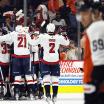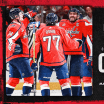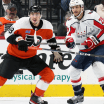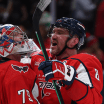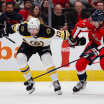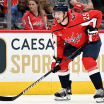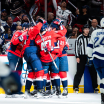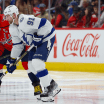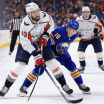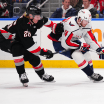There are 31 teams in the NHL these days, and every single one of them aspires to a short summer. They all want to play in the last NHL game that matters in a given season, the last game of the Stanley Cup Final series.
That Summer Feeling
The silver lining to the Caps' April exit was a longer summer for rest, recovery and physical gains
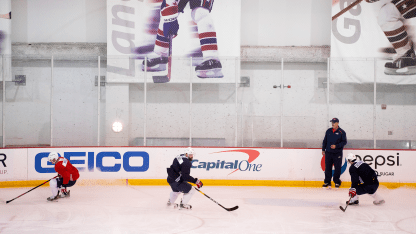
The season before last, the Caps played in and won the final NHL game of the 2017-18 campaign, claiming the first Cup title in franchise history with a 4-3 win over the Vegas Golden Knights in Sin City, in Game 5 of the Cup Final.
The Caps won the coveted chalice, an amazing parade, individual days with possession of the Cup, and beautiful Stanley Cup championship rings. They also won the shortest summer most of them have ever had as professional players. As for Vegas, they also won the shortest summer most have had, but that's all. No Cup. No parade. No day with the Cup. No ring.
Every year at this time, we hear about the dreaded Stanley Cup hangover that allegedly afflicts the team that won it all. It's a real thing, but it manifests itself in different ways. In some instances, the defending champs get out of the gate slowly. The Caps faced a daunting early season schedule in 2018-19 as they went about defending their crown, but their worst stretch of 2018-19 came in January, just ahead of the All-Star break/bye week. The Caps went 3-7-3 over a 13-game span leading up to the break, and they lost seven straight (0-5-2) immediately before the break, their longest losing streak in more than five years.
Rinkside Update | September 14
Maybe that was the hangover, maybe it was something else. But the reality of it is, by the time a team wins the Cup in the early part of June, half of the league has already had almost as much of an offseason as the champs are going to get. And the champs' offseason is going to be liberally dotted with parties and celebrations and other expressions of joy. There's not a lot of time left over for working out, recovering and getting ready for the upcoming season.
On April 24 of this year, the Caps' bid for back-to-back Cup titles died when the Carolina Hurricanes ousted Washington in double overtime of Game 7 of the opening round playoff series between the two Metropolitan Division rivals. That wasn't an optimal result by any means, and the sting of that loss was evident in conversations with players that night, in the days after, over the summer, and even at camp these last few days.
But in the "silver lining" department, the Caps had 44 extra days of summer/offseason with which to operate as they attempt to get back to the top of the mountain, and we wondered how much good that might do them.
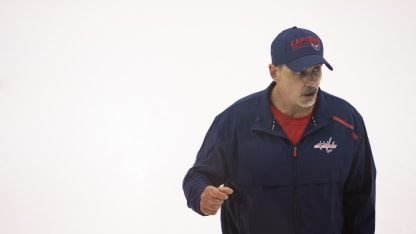
© Patrick McDermott
Among all the strength and conditioning coach/gurus in the NHL, no one has been on the job at this level as long as Mark Nemish, the Caps strength and conditioning coach. Nemish is heading into his 19th NHL season and his 13th in Washington. Late in the summer, we had a chance to talk with Nemish about some of the benefits of a longer summer.
"Well, it's definitely got a couple of different tracks in terms of how it could help out players on a team such as ours," says Nemish. "For guys that are playing a lot - that have the most minutes during the season and into the playoffs - getting knocked out in the first round or second round or what have you allows a lot of time for recuperation, both mentally and physically. It gives them more time to be able to prepare for the next season it gives them a little more time off where they can just get away from the game, as opposed to the season before where you're winning the Cup. You're still really involved mentally with having to deal with the celebration and all of the things that go with it. By the time you take a big exhale, you're five or six weeks out and having to get back on the ice again without a lot of off-ice preparation for that.
"On the other track, you have the young players on that team who maybe need to develop, and maybe they're not getting all of that ice during the playoffs and don't need as much recuperation, obviously due to age and what have you. But they'll spend a lot longer time being able to gain and have adaptations within their bodies to try to make those gains because once you get into training camp and the season, it's hard to make physical off-ice gains during an NHL season."
The Caps do have a fair number of players now whose age begins with the number "three."
"For myself and for I think a lot of these guys, we haven't been out in the first round for a while," said 32-year-old right wing T.J. Oshie, days after the Caps were eliminated in April. "But this will be maybe - potentially - one of the more important summers of my career in that I am getting older, we have a good team here, and you hope that you're not going to have this long of a summer ever again.
"There is obviously a small setback with my collarbone, but I have time to get my body physically prepared to make another good run. And last summer, that wasn't the case. Last summer was maintenance, last summer was just trying to get everything working correctly to play again. So this summer, it's going to be fun to see where I can get myself to, physically."
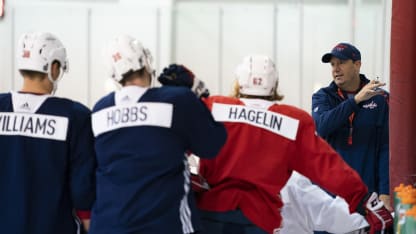
© Patrick McDermott
Washington center Lars Eller is one of the league's most consistent players, and he is a guy who takes good care of his body. But even Eller understands the and embraced the benefit of those extra weeks of offseason, and he celebrated his 30th birthday two weeks after the Caps' season came to a halt.
"I'm going to definitely take a long break now, probably three or four weeks before I start thinking about working out again and stuff like that," said Eller in late April. "As much joy and everything that last summer brought with it, it was also quite stressful, and there was not a lot of time for the body to recuperate. It will be a much-needed break for my body over the next couple of months."
As Nemish alluded to earlier, the important benefit of a longer summer for younger players is the ability to spend more time shaping their bodies. For older players, recovery is what matters most.
"They can take more time away from the physical part of the daily grind and take more weeks off just to let their bodies recover," says Nemish of the older set. "As a player gets older, the recovery is longer for these players. Usually when a player is older, they have their own routines by this point that work for them at their age. And they can kind of slide into their routines throughout the summer. They have more time then to kind of ramp their off-ice workouts up.
"The longer you go in the playoffs, the harder it is for a player who is playing a lot - your top three lines and probably all six [defensemen], let's say - to maintain any type of off-ice strength and what have you during the playoffs. Because there is such a mental and physical aspect of every single game during the playoffs, we don't have mandatory workouts for those that are playing a lot. What we have is mandatory recovery indices that we really focus on. Then when you've got your fourth liners or your 'black aces' who aren't playing a lot, we are ramping up their off-ice work. So it's different for them. The guys who are playing a lot and the guys who are older and playing a lot, they are getting out of off-ice shape as you go further and further into the playoffs. And so it will take longer for them to get into off-ice shape. So that time off affords them that mental break and the ability to kind of ramp up their off-ice work with an early exit."
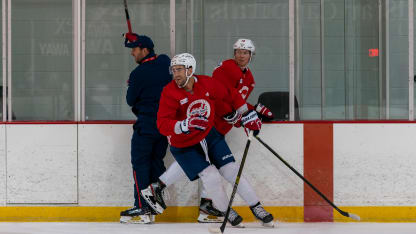
Not only was Washington's summer much shorter in 2018, a lot of that time was occupied with planning and preparing for Cup days and parties, and some of the days surrounding those parties were days of backsliding as far as training and nutrition are concerned. Many of the players, as they hoisted the 34-and-a-half-pound holy grail over their heads on their own personal Cup days, joked aloud that their frequent "lifts" should please "Nemo."
The reality is that today's players are much more dialed into taking care of their bodies off the ice in terms of conditioning and nutrition. And why not? That diligence enables players to prolong their careers and make more money for themselves and their families. Most of them aren't going to be going into more lucrative or exciting endeavors once their playing days are over, so they want to wring as many games and seasons as possible from their NHL careers.
"When I started almost 21 years ago," begins Nemish, "it's not that there wasn't an emphasis to win every game. I just don't think that the preparation to go into every game 20 years back is the same that it is now. The amount of mental and physical preparation for every game is immense these days. Your coaching staff, head coach and assistant coaches address every single game the same way. There is no, 'Oh, we've got to win this one.' You have to win every single game. There is an expectation to win every game of those 82.
"And so from me, as someone on the inside but on the outside looking in, I think there is just so much more pressure for a player to perform every game with how they're evaluated. They are evaluated in so many different ways, on the ice and off the ice and with what we do in testing and all the rest. I think there is more of a mental grind with the seasons now as opposed to maybe 20 or 30 or 40 years ago. And here is where I see it; it's in the day-to-day things that I see off the ice. We eat way healthier now than we ever did before. That's not because they are being forced to; much of it is a player's decision in terms of that. There is far less eating of junk and far less alcohol drinking during a season than there was 20 years ago, or even in the days of the '80s when guys would come in after a big bender and they'd be on the bike sweating it out, knowing that they had to pay that punishment. But you just don't see that. You don't see it anymore. I just think that they have to be so well prepared to play every game at the highest level possible."
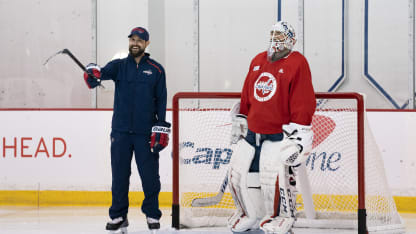
© Patrick McDermott
Clearly, getting a mental break after the long season is also critical. Additionally, players don't get to spend nearly as much time as they'd like to with their families during the season, so the offseason is important from that standpoint.
"The main thing for everyone is just to catch up on their family time more than anything," says Caps goaltender Braden Holtby. "And then get away from the game mentally, really use it to refresh everything so that when we come back, you're excited about every little thing about a hockey season instead of trying to push yourself through everything at times. It's one of those things where there is a positive in everything. This [early exit] isn't what we wanted, but we can use this to our advantage. If we come in with a full team, a clear head and extra motivation, it can create a lot of success."
Finally, losing your physical and mental edge in the offseason can make you an endangered species. Younger, faster and cheaper are all words we hear bandied about by management types, and the clock is always ticking on every career. It's a keep up or keep out business.
"It's weird that it's April for sure, and there will be a little bit of time to reflect," said right wing Tom Wilson days after the Caps' exit. "We've played a lot of hockey these last 12 months. So it's going to be important to take some time. I haven't really thought about it much yet, but you've got to keep improving.
"Nowadays, if you don't keep improving, there is so much young talent in the game and there is so much competition for jobs, that you've got to be improving in the offseason. I'm going to be trying to improve my game and working hard. We've got to be ready to go next year. It's going to be an important year; we're going to have a little bit of a different group maybe, and we know that this wasn't the outcome that we wanted. It's going to be on myself and the rest of the guys to show up ready to go and make the most of next year."
Fast forward four and a half months, and training camp is underway. Players have some hop in their step, there is a clean slate, and there is competition for roster spots. And although it's certainly early, Caps coach Todd Reirden sees some of those benefits of the longer summer of 2019.
"It is definitely a different feeling," says Reirden. "It definitely has an impact in how they showed up and in what I've seen from their testing results both on and off the ice, and in their energy in practice. They just seem to be fresher, and in a much better spot health-wise as well. It's a different group, it's a different situation than it was last year. You have a bitter taste in your mouth from how things went. We had done some amazing things as an organization to win a Stanley Cup, and now somebody else has that title. Now it's up to us to do everything that we can to regain that title.
"From the preparation and the discussions that I had with all players this summer, I sensed that they were eager to get back at it. Unfortunately things didn't go our way for a number of different reasons, but now, what is our response going to be? We can't change what has happened in the past, we can only work on this team that we have now, starting the 2019-20 season. It has allowed us to do some different things practice-wise through the first few days here, it has allowed us to tweak some things systematically that can allow us to be a little bit more aggressive, and in using not only the personnel that we acquired at the trade deadline, but also were able to acquire this summer. It's an exciting time with a few new faces and with a few old faces leaving our team, and now some different responsibilities for players."
Evgeny Kuznetsov | September 14
Postcards From Camp -The NHL announced on Saturday morning that Caps center Evgeny Kuznetsov will be suspended for three games for "inappropriate conduct" after the IIHF suspended him for four years for testing positive for a banned substance (cocaine) at the IIHF World Championship tourney in May. Kuznetsov will miss the first three games of the season and won't be eligible to suit up until Washington's Oct. 8 home game against Dallas.
Kuznetsov issued the following statement on Saturday morning:
"I have decided to accept the NHL's suspension today. I am once again sorry that I have disappointed my family, my teammates, and the Capitals organization and fans. I promise to do everything in my power to win you back with my actions both on and off the ice. I also understand that I am fortunate to have an opportunity to make things right. Thanks to the Capitals, NHL, and NHLPA, I have taken many steps in the right direction and I'm confident that I will continue on that path. I am grateful for everyone's support and I'm looking to move forward from this point. While I can appreciate that people may have additional questions, I will not be commenting further on this matter."
Later in the day, Kuznetsov held a brief
press conference
in which he expanded a bit on his earlier statement, and Reirden also addressed the issue thoroughly in a
Saturday afternoon conference
with media.




